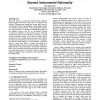Free Online Productivity Tools
i2Speak
i2Symbol
i2OCR
iTex2Img
iWeb2Print
iWeb2Shot
i2Type
iPdf2Split
iPdf2Merge
i2Bopomofo
i2Arabic
i2Style
i2Image
i2PDF
iLatex2Rtf
Sci2ools
126
click to vote
GECCO
2008
Springer
2008
Springer
How social structure and institutional order co-evolve beyond instrumental rationality
This study proposes an agent-based model where adaptively learning agents with local vision who are situated in the Prisoner’s Dilemma game change their strategy and location as well. Besides both the copying-highest-scoring strategy and the tie dissolution among defectors as the instrumental rationale, two other heuristics are considered: following-the-majority in the influence process; and the tie dissociation between cooperators and defectors in the selection process. Under the overall setting which is not favorable to cooperation, it turned out that cooperative culture is less likely to emerge and its transmission is more unstable when more agents stick to follow the trend on the fixed network. Given the same set of conditions but with the small amount of social plasticity, cooperative culture is much more likely to emerge and sustain on a hierarchical network where the average clustering coefficient is higher and the average path length is still similar compared to those of the...
| Added | 09 Nov 2010 |
| Updated | 09 Nov 2010 |
| Type | Conference |
| Year | 2008 |
| Where | GECCO |
| Authors | Jae-Woo Kim |
Comments (0)

